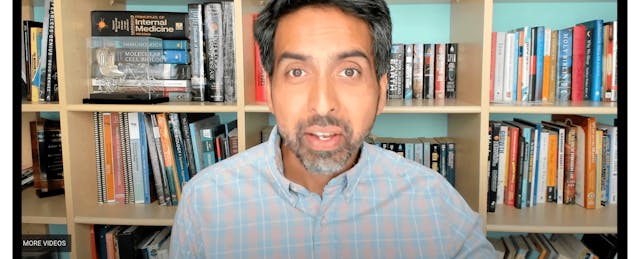For 50 ninth graders, showing up to school this fall meant taking part in an experiment.
The students had enrolled in the latest effort by Sal Khan, founder of Khan Academy, the online tool he started by making videos on YouTube that is now used by hundreds of districts in the U.S.
Khan’s new project is a fully online school with a mix of self-paced online learning and group activities. The new Khan World School pitches itself as a way for self-motivated students to break out of the traditional classroom. And its advertising materials emphasize the community component, with daily seminars, small group tutorials and peer tutoring.
It’s like Khan’s other efforts, in that it’s centered on “mastery learning” — which is based on a student's ability to demonstrate proficiency. But with this one, Khan is really swinging for the fences.
After the increased student disengagement coming out of the pandemic, Khan wanted to show that the tuned-out student behaviors affiliated with the emergency rollout of remote learning isn’t characteristic of online learning.
During talks with a K-12 public charter school in Phoenix called Arizona State University Preparatory Academy, Khan thought he’d found a way to bring quality education to top students all over the world. “A couple years ago, we said, well, we should do an online school that can actually scale that people could use just as is, or it could be used alongside physical programs to supplement them,” Khan says.
Those talks led to a partnership with ASU Prep that opened up access to the school’s Arizona charter. That meant Khan could launch his new Khan World School which functions as an independent school for students outside the state, and outside the U.S., and gives students within the state taxpayer-funded tuition.
The idea appealed to ASU Prep. Amy McGrath, chief operating officer of ASU Prep, says that it fits right into the “innovation and scale obsession that ASU has.”
McGrath says she expected the students in the new online school, which launched in August, to mostly come from Arizona for their first year. Arizona pays the tuition for the students who live in the state because of ASU’s charter status. Students in other states pay $9,900 per year, and for non-U.S. students, the tuition bill runs $12,900 per year. But the first group of ninth graders actually came from six states and eight countries, she says.
So far, the experiment has been successful with students sailing through internal assessments, according to Khan and McGrath. The school’s leaders plan to admit a couple of hundred 6-12 students over the next three to four years. There are currently 50 students, all ninth graders.
Questions About the Model
The pairing with ASU Prep gives Khan World School access to its charter status — but that also embroils the school in the larger controversy around virtual charters.
Enrollment in virtual charter schools has shot up over the last couple of years. But performance for those schools is often poor, with one federal report suggesting that students in virtual charter schools average 25 percent lower scores on math assessments than traditional schools.
Some researchers worry particularly about the incentives these schools set up, blurring public education dollars with private profits.
Though ASU Prep is a nonprofit, the majority of full-time virtual schools are run by for-profit management companies, according to Michael Barbour, a professor of instructional design at Touro University. And it's impacted the sector broadly. “The reality is corporations are not beholden to students,” Barbour adds.
This can set up skewed incentives where the schools are trying to make as much cash as they can rather than focusing on student success, he indicates. That’s why, according to research from the National Policy Education Center, class sizes in these programs run larger.
Khan World School's brash promise to expand access to top-quality education “anytime, anywhere” may actually clash with the realities of virtual charter models and their Silicon Valley-style focus on scale, Barbour says.
These full-time online programs often enroll higher-performing students, and fewer students with greater academic challenges or those with fewer resources — such as those qualifying for free and reduced lunch or special education, Barbour says. Meanwhile, online charter schools enroll about three to five times the proportion of gifted students, he adds.
“And when you look at their actual performance, full-time, online programs performed quite miserably compared to the brick-and-mortar counterparts,” Barbour says. That’s the opposite of what you’d expect if the purpose of these programs is to serve kids that aren't being served in the brick and mortar environment, Barbour says.
Also, in Barbour’s view, most virtual charters don’t expose students to the perspectives that you’d get in public education. So, for Barbour, there’s some logic to Khan’s focus on mastery. But the model seems overly focused on a corporate understanding of education, he argues, devoid of the exposure to the diverse perspectives you get in a typical public setting.
Khan World School is somewhat unique in this form of charter, in that it’s a full-time virtual school not limited to a single state. And for Khan, it’s the first step in delivering on his larger vision of what he calls “a free world-class education for anyone, anywhere.”
“That’s always been a dream, it's not like we're just gonna deliver it overnight,” Khan says. “[But] I actually think it is now true that anyone in the state of Arizona has access to a free world-class education. And then outside of Arizona, it’s affordable, it’s still here. It’s not dirt cheap, but it’s accessible.”
But whether the school successfully delivers on its promises will largely depend on whether it can overcome the limitations of other virtual charters, Barbour says.


